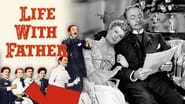liublok
Movie very well represent extremist time, time of religion. Just awful time. I'll show this movie to my children, to show them how was time of extreme religion when people didn't think with their head.
gkeith_1
Wife portrayed as totally dumb. She had no job. She had control over no money. She almost said her husband was the smartest, and that she was stupid. Archie and Edith.Husband didn't want her to spend one dollar to hear a speech from a modern woman who would be discussing women's situation in the eighteen eighties.Good acting. I am giving it eight out of ten because of the portrayal of attitudes of the time. This is a wealthy family, of white WASPS who are Episcopalian mostly church goers. A friend is Methodist, in whose church there are slight Protestant Christian differences from the Episcopalians.Elizabeth Taylor gets third billing. She is ridiculed by other reviewers here, but I think she did very well. Her character is forward for a female of the time, and her romantic interest is naïve and selfish. He is trying to emulate the personality of his curmudgeon of a father; the father of this film.Irene Dunne was a great singer; witness her voice in Show Boat or was it dubbed? She hums a few bars here, at least in the version I saw.Powell was not just Nick Charles. He was also Florenz Ziegfeld. He was also Godfrey in My Man Godfrey, in which he is a bum who becomes a butler; he is the Forgotten Man of the Great Depression.Here, he is the cantankerous curmudgeon, the name of which I have mentioned several times. He does not respect women, and he talks down to them. He teaches his sons that women are ignorant, backward crybabies who would never carry the weight of the world on their shoulders.White WASPS are the main characters. They are the elite. Irish women, or even recent immigrants, are portrayed as airheads who cannot carry trays as maids, who have nothing is their ditzy little heads.ZaSu Pitts does a turn here, of a cousin. She is not her usual comedic self. She is more droll and lifeless than I have seen her in other performances.Martin Milner as a young lad is interesting. He later appeared in the Adam Twelve TV series, as a police officer.Do not call this film dated. It was made after World War Two, when the world was crying for sweet nostalgia, a world of Gilded Age niceties and cooks and housemaids. The audience was tired of movies about killing and fighting.The long running play on which this film is based ran from pre World War Two to afterward, actually starting in the later years of the Great Depression. The play and film must have both been uplifting to audiences during dark and gloomy times.Eight out of ten.
duanyfinancial
I am a movie collector/historian, with thousands of titles in my library, dating back to 1914, and I consider this MASTERPIECE, Life With Father(1947), the best film ever made. First of all, the story, was an autobiography by Clarence Day Jr.(1935). It was made into a play in 1939. "The 1939 Broadway production ran for over seven years to become the longest-running non-musical play on Broadway, a record that it still holds. It also held the title of the longest running Broadway play of any type of all time from 1947 to 1972."When the play was made into a movie, in 1947, it garnished 6 Academy Award nominations, including one for Best Actor, William Powell.Apart from all this, this movie is a sheer delight, dealing with the simple fact, that Clarence Day, the patriarch of the family, has never been baptized, but, much more important than this, this autobiographical story, shows us what life was like in a middle class family in New York city, circa 1880. Masterful director, Michael Curtiz, juggles religion, and a near death sickness, with romance, family life, and mingles it all with a joyful comedy of manners. William Powell, and Irene Dunne are flawless, Edmund Gwenn(Miracle on 34th Street), and Zasu Pitts, are fabulous as supporting players, and ingenue, Elizabeth Taylor is exquisite in this role that took her from children parts to young adult. All in all, this movie should be watched every Father's Day, in remembrance of what Hollywood once achieved in it's Golden Age.
writers_reign
On a superficial level - and come to think of it there isn't really a deeper one - this is Meet Me In St Louis without the songs and the story tilted towards the parents rather than the children. On the other hand Sally Benson's reminiscences of her life in turn of the century St Louis ran in the New Yorker sans words and music much as Clarence Day's hard-cover reminiscences of his own parents so the comparison holds. The forties were particularly rich in this kind of nostalgia and also included I Remember Mama. All require a certain amount of good will if one is to view them today but those who are able to surrender to the charm on display will be rewarded with a good old-fashioned wallow in a world without angst where a feisty heroine was a shot in the arm that wasn't addictive. Irene Dunne plays against Powell as well as Myrna Loy and trivia buffs will welcome the chance to catch Martin Milner in his debut. A decent print and we'd be off to the races.



